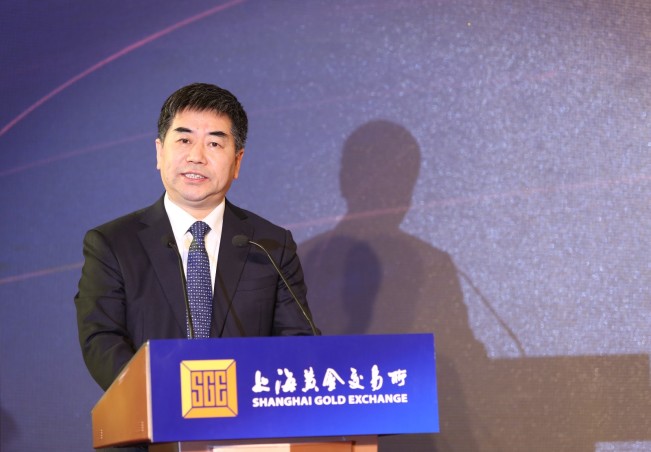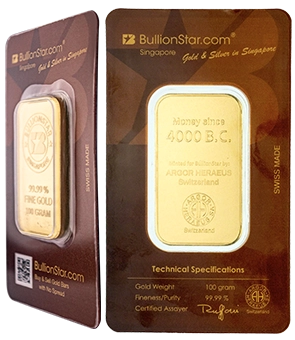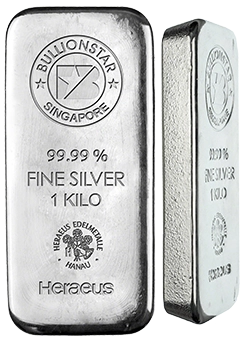BullionStar attends 2016 LBMA Conference in Singapore
Introduction
This year, the well-known annual conference of the London Bullion Market Association (LBMA) was held in Singapore between Sunday 16 October and Tuesday 18 October at the impressive Shangri-La Hotel. The conference attracts delegates and speakers from across the world of bullion, with representatives from precious metals refiners, mints, bullion banks, brokers, trading and technology providers, bullion dealers and bullion wholesalers. This year over 700 delegates attended.
The main speaker sessions, presentation and panel sessions of industry representatives ran over two days, between Monday 17 October and Tuesday 18 October. Topics covered in the speaker sessions were numerous and varied and included the bullion market in China, developments in the Indian gold market, responsible gold guidance, LBMA updates and developments, a dedicated session on platinum group metals, and a session on the financing of refineries.
As interesting as the speaker sessions and presentations are, many of the conference attendees use at least some of their time at the LBMA conference to engage in meetings with each other on the sidelines. This explains the constant stream of small breakout meetings that took place in the hotel lobby’s seating areas, as well as in dedicated meeting rooms around the hotel. BullionStar also used the occasion to meet with existing suppliers from the refining, minting and wholesaling world, as well as to discuss potential business opportunities with new suppliers.
There were also approximately 20 exhibitor stands at the conference, including stands hosted by CME Group, Brinks, the World Gold Council, IE Singapore (Singapore’s trade development authority), Istanbul Gold Refinery (IGR), Metals Focus consultancy, Cinnober, and Nadir Refinery.
Hong Kong – Shenzhen Gold Connect
On the Sunday prior to the conference, the Chinese Gold and Silver Exchange (CGSE) and the Singapore Bullion Market Association (SBMA) co-hosted a pre-conference presentation titled “Building a physical gold corridor in Asia: Shanghai – Hong Kong / Qianhai – Singapore”, at the hotel, which featured a series of discussions about the CGSE’s new gold trading and vaulting project located in the Shenzhen free trade zone at Qianhai, just across the border from Hong Kong.
Haywood Cheung, Permanent President of CGSE, gave an introductory overview of the Qianhai project, showcasing it as part of China’s “One Belt, One Road” plan, after which Dong Feng, Ping An Commodities Trading in Shenzhen presented a detailed explanation of how the linkages between the CGSE’s trading platform in Hong Kong and Qianhai’s clearing and settlement will for the first time enable the trading of both onshore and offshore Renminbi and the trading of onshore and offshore gold. The Qianhai project integrates trading, clearing, settlement and vaulting, with a 1500 tonne capacity vault, and a trading hall. ICBC will provide settlement of both onshore (Shenzhen) and offshore (Macau) Renminbi as well as providing use of its Shenzhen gold vault (onshore gold settlement) until the CGSE Qianhai vault is completed.
This onshore and offshore trading and settlement of Yuan and physical gold will facilitate arbitrage trading, and is another step in China’s liberalisation of its currency and its gold market as it links the Chinese currency to physical settlement of gold inside and outside of China. This initiative is one to watch and will demonstrate the Chinese government’s gradual easing of cross-border restrictions on currency and gold flow. Next phase gold trading in Qianhai by CGSE member companies will commence on 7 December.
With the CGSE having already established a gold trading link with the Shanghai Gold Exchange (SGE) though its Shanghai-Hong Kong Connect, and with the Shenzhen (Qianhai) – Hong Kong Connect now coming on stream, the CGSE is also planning a Singapore – Hong Kong Connect, and a Dubai – Hong Kong Connect, which, if they materialise, will extend physical gold corridor (trading and vaulting connections) across the Asian region and beyond.
Albert Cheng, CEO of the SBMA, wrapped up the afternoon with an overview presentation of SBMA’s aspirations to evolve Singapore into a bullion market hub for the entire ASEAN region, including countries such as Indonesia, Vietnam and Myanmar. However, details of how this plan will be implemented were not addressed. Cheng also showcased the SGX gold contract which is backed by the SBMA, but which has yet to take off despite being launched over 2 years ago.

LMEprecious gold Futures
The first event we attended on Monday was an early morning presentation by the London Metal Exchange (LME) about LMEprecious, its new suite of spot, daily, and monthly gold and silver futures contracts to be launched in the first half of 2017, that will trade on LME’s trading platform, with market-making offered by 5 investment banks such as Goldman Sachs and ICBC Standard Bank. These futures are for delivery of unallocated metal in the London market and the contracts will still clear through the London bullion market’s LPMCL unallocated bullion clearing system. In time, the LME plans to launch platinum and palladium futures contracts on LMEprecious, as well as options contracts on all 4 metals. The LMEprecious platform will also link into LBMA’s planned trade reporting system.
ICE gold Futures
On Monday morning, ICE Benchmark Administration (IBA), a direct competitor to LME in the precious metals trading and clearing space, used the LBMA conference to make a very well-timed announcement that it too will be launching a new gold futures contract for delivery of unallocated gold in London (loco London). The ICE contract will trade on the ICE US futures platform and will begin trading in February 2017, in advance of the LME contracts. This contract is being designed to be compatible for settlement within the LBMA Gold Price auction which IBA administers in London, and it will, according to IBA, allow the introduction of central clearing into the auctions, and thus facilitate wider auction participation. Currently,the direct auction is exclusively open to a handful of large banks that have large bi-lateral credit lines with each other. At this stage it’s unclear how the connections between the futures contract and the LBMA Gold Price auction will work, but BullionStar plans to examine this development in future coverage.
Unallocated Gold, Gold Lending and Central Banks
Given that the LBMA Conference is attended by dozens and dozens of precious metals refineries and mints, it was notable that the subject of “unallocated gold" cropped up in the discussion of LMEprecious and ICE futures contracts, but that there was no discussion in the actual LBMA conference programme schedule of ‘unallocated gold’ as the term is used by the LBMA. An unallocated gold position in an account in the London gold market is merely a contractual claim for gold against the bank that the account is held with. As such, it is a synthetic gold position.
It was also odd in our view that there was no seminar or discussion about the London gold lending market within the conference programme. As gold lending is an important and influential area of the London gold market, it affects marginal gold supply, and it has an impact on gold price formation. Notably, the topic of central bank activities in the gold market was completely missing from the conference schedule this year, a notable omission compared to previous years.
Gold price benchmark for Singapore revisited
In another announcement on Monday morning at the conference, the Singapore minister for trade and industry announced that the SBMA in conjunction with the LBMA and ICE Benchmark Administration (IBA), they’ll begin a feasibility study on launching a “pre-AM gold price” auction, which would serve as a benchmark for the Asian region and which would be held at 2pm Singapore time, in advance of the European trading day. This Singapore benchmark was already discussed and announced over 3 years ago, but has put on hold in 2014 due to European regulatory investigations at that time into manipulation of the London Gold Fix.
LBMA Trade Reporting
The conference speaker programme opened on Monday morning with introductory remarks from Lim Hng Kiang, Singapore Minister for Trade and Industry, outgoing LBMA chairman Grant Angwin, incoming newly appointed Chairman Paul Fisher who recently arrived from the Bank of England, Tim Pearce, the chairman of the London Platinum and Palladium Market (LPPM), and LBMA CEO Ruth Crowell.
The LBMA CEO’s introductory speech touch on the planned launch of trade reporting services for the London Gold Market. This trade reporting contract has been awarded to financial technology providers Cinnober – BOAT Services – Autilla, after those partners won the LBMA’s recent RfP tender which had been launched in October 2015. Ruth Crowell referred to trade reporting as ‘Phase 1’ of a new suite of technology services. Trade reporting will be launched in Q1 2017, and will, according to the LBMA “demonstrate of the size and liquidity of the market for clients, investors and regulators”. Phase 2 of this project refers to services such as central clearing in the London bullion market.
Further background to the chosen trade reporting solution was provided by Jamie Khurshid, the CEO of BOAT Services. Surprisingly, even though this RfP took the LBMA over 1 year to complete, it will still now require a ‘design phase’ where BOAT/Cinnober needs to meet with LBMA member firms to discuss the scope of reporting, followed by a period of customisation and configuration of the implementation. Details on what exactly will be reported (the scope) remain sketchy, and since full London gold and silver trade reporting by all participants (including central banks) is not mandatory in a regulatory sense, it remains to be seen to what extent transparency will be improved. Because if you don’t have full mandatory reporting, you don’t have transparency. In another related presentation, Sakhila Mirza, LBMA General Counsel stated that trade reporting will apply to loco London spot trades, forwards and options, but that “LBMA and its members retain control over the scope of reporting“, which highlights the self-regulatory nature of the reporting, and again may suggest that the trade reporting may not be as granular or have as much informational value as some may think, especially given that central banks will be exempt from trade reporting.
The Shanghai Gold Exchange and Chinese Gold Market
Monday’s schedule also included an informative series of presentations titled “The Bullion Market in China" from an impressive list of experts. Jiao Jinpu, chairman of the Shanghai Gold Exchange (SGE), provided an overview of the latest developments from the SGE, which has a network of 61 vaults across 35 cities in China, and where physical trading volume reached 34,100 tonnes of gold in 2015. Jinpu revealed that the International Board of the SGE (known as SGEI) has, since launch in September 2014, traded 7,838 tonnes of gold, while the daily Shanghai Gold Price auction, only launched in April 2016, has already traded 384 tonnes, worth RMB 105.5 billion, giving it an average daily trading volume of 3.4 tonnes. Jinpu also vindicated BullionStar’s estimates of 2015 SGE gold withdrawals, because, in the words of Jinpu, he sits on the SGE tap, and knows exactly how much gold has been withdrawn from the Exchange vaults.
In his speech, Jinpu announced that in the near future, the SGE and other exchanges will begin using the SGE Gold Price benchmark to develop gold price derivative products.
In another notable confirmation, Yang Qing, from the Bank of China, one of China’s largest commercial banks involved in the global gold market, responding to a question posed by BullionStar, said that he thinks that in future, the Chinese currency, the Renminbi, should have an element of gold backing.
In what was probably one of the most interesting and revealing presentations from BullionStar’s perspective, and which vindicates the extensive research and analysis that BullionStar’s precious metals analyst Koos Jansen has done on the Chinese gold market, Matthew Turner from Macquarie Commodities Research in London gave a presentation about how to accurately capture and estimate the total trade flows of gold into China given that China does not publish this data itself.
One of Turner’s approaches is to use the trade data of all other countries which do report gold exports to China. This approach reveals that China imported 1626 tonnes of gold in 2015 from a number of countries, primarily Hong Kong, Switzerland, the UK and Australia. Another more elegant Turner approach is to take China’s total import figure which it does publish, as well as the summated figures of all of China’s other import categories of data, which China also does publish, and then derive the gold import quantities as the delta.
This approach yields a net gold import figure of 1693 tonnes in 2015. Both of these figures are very close to BullionStar’s previously published Chinese gold import data estimates, as calculated by Koos Jansen. Adding 2015 Chinese gold mining production to imports gives total new supply coming into the Chinese market in 2015 in excess of 2000 tonnes, which is over 1000 tonnes higher than consumer gold demand as estimated by consultancies such as GFMS and the World Gold Council.
LBMA and SGE familiar with BullionStar’s research
On the Monday evening we attended a dinner hosted by Australia and New Zealand Bank (ANZ) at Singapore’s famous Raffles Hotel. Just after arriving we had the privilege of chatting for a few minutes to Jiao Jinpu, chairman of the Shanghai Gold Exchange (SGE) via his colleague and interpreter Jess Yang, and we highlighted to him BullionStar’s extensive research from Koos Jansen on the China gold market and the SGE, which we were impressed that he was already familiar with. Dinner conservation was interesting and varied as we were seated at a table with representatives of the London Metal Exchange, ICE Benchmark Administration (IBA), the CME Group, GFMS, Metalor Singapore, and the Royal Canadian Mint.
During the conference, we also learned that the LBMA is familiar with BullionStar’s research into the London gold market, another confirmation that the analysis that we publish is read widely within the bullion industry.
As the conference wrapped up on the Tuesday afternoon, delegates were asked to forecast what the US Dollar gold price will be this time next year. Audience members submitted their forecasts via a special handheld device in the auditorium, which resulted in an average forecast of US$ 1347.
BullionStar Seminar during LBMA Week
To coincide with the fact that the LBMA conference was located in Singapore this year, BullionStar hosted a number of events at its shop and showroom premises on New Bridge Road, Singapore. On the Saturday prior to the conference, 15 October, BullionStar held a ‘meet and greet’ morning, where customers and anyone in town for the conference could pop in and chat with BullionStar staff. On Wednesday 19 October, BullionStar held a precious metals seminar in its showroom premises at which BullionStar CEO Torgny Persson and Precious Metals Analyst Ronan Manly presented to an audience on the topics of Bullion Banking, and Transparency vs Secrecy in the gold market, respectively. The presentations and transcripts of the speeches will be published on the BullionStar website in the near future.
Popular Blog Posts by BullionStar
 How Much Gold is in the FIFA World Cup Trophy?
How Much Gold is in the FIFA World Cup Trophy?
 Essentials of China's Gold Market
Essentials of China's Gold Market
 Singapore Rated the World’s Safest & Most Secure Nation
Singapore Rated the World’s Safest & Most Secure Nation
 Infographic: Gold Exchange-Traded Fund (ETF) Mechanics
Infographic: Gold Exchange-Traded Fund (ETF) Mechanics
 BullionStar Financials FY 2020 – Year in Review
BullionStar Financials FY 2020 – Year in Review
 Back-to-Back Records: BullionStar Sets New Highs in September and October 2025
Back-to-Back Records: BullionStar Sets New Highs in September and October 2025
 Jim Rogers on Gold, Asia, and the Future of Money
Jim Rogers on Gold, Asia, and the Future of Money
 Market Update: Physical Gold & Silver Shortages
Market Update: Physical Gold & Silver Shortages
 A Glimpse Inside BullionStar’s Precious Metals Vault
A Glimpse Inside BullionStar’s Precious Metals Vault
 Rick Rule on Why Gold Could Reach $10,000 as the Dollar Declines
Rick Rule on Why Gold Could Reach $10,000 as the Dollar Declines






 BullionStar
BullionStar 1 Comments
1 Comments












